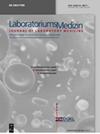多发性硬化症患者干扰素i型受体亚型的表达、临床反应和中和抗体的发展——一项前瞻性研究的结果
IF 0.1
Q4 OTORHINOLARYNGOLOGY
Laboratoriumsmedizin-Journal of Laboratory Medicine
Pub Date : 2016-04-01
DOI:10.1515/labmed-2015-0020
引用次数: 1
摘要
背景:干扰素-β (IFNb)是治疗复发缓解型多发性硬化症(RRMS)的一线药物之一,它是一种具有免疫调节作用的细胞因子。对药物的反应存在高度的可变性,除其他因素外,这是由于在治疗后期出现的中和抗体(nab)的存在。方法:本研究的目的是确定是否可以根据治疗开始前i型干扰素受体IFNAR1、IFNAR2a、IFNAR2b和IFNAR2c的表达水平来预测IFNb治疗的反应和NAB的发展。采用实时聚合酶链反应(real-time polymerase chain reaction, PCR)检测163例复发缓解型MS患者样本中IFNAR的表达水平。结果:在治疗期间发生NAB的患者中,治疗前IFNAR2c表达水平略低于NAB阴性患者。其他IFNAR亚型和同型的表达水平无显著差异。基线IFNAR水平不能预测2年后的临床反应。结论:总体而言,IFNAR2c基线水平对NAB的发展有小的、不显著的影响,但与临床终点无关。IFNAR2c受体的低表达可导致更高的IFNb水平,从而诱导更高的抗体应答率。本文章由计算机程序翻译,如有差异,请以英文原文为准。
Expression of interferon type-I receptor isoforms, clinical response and development of neutralizing antibodies in multiple sclerosis patients – results of a prospective study
Abstract Background: One of the first line treatments for relapsing-remitting multiple sclerosis (RRMS) is interferon-β (IFNb), a cytokine with immune-modulatory effects. There is a high degree of variability in the response to the drug which is, among other factors, due to the presence of neutralizing antibodies (NABs) occurring late during therapy. Methods: The objective of this study was to determine whether the response to IFNb therapy and NAB development can be predicted based on the expression levels of the type-I interferon receptors IFNAR1, IFNAR2a, IFNAR2b, and IFNAR2c before start of treatment. The IFNAR expression levels in 163 samples of patients with relapsing-remitting MS were measured by real-time polymerase chain reaction (PCR). Results: Pre-treatment IFNAR2c expression levels were somewhat lower in patients who developed NAB during treatment compared to NAB-negative patients. No significant differences in the expression levels of other IFNAR subtypes and isotypes were found. Baseline IFNAR levels were not predictive of the clinical response after 2 years. Conclusions: Overall, there was a small, non-significant effect of IFNAR2c baseline levels on NAB development but no relation to clinical endpoints. Lower expression of IFNAR2c receptors could lead to higher IFNb levels inducing a higher rate of antibody response.
求助全文
通过发布文献求助,成功后即可免费获取论文全文。
去求助
来源期刊

Laboratoriumsmedizin-Journal of Laboratory Medicine
MEDICAL LABORATORY TECHNOLOGY-
CiteScore
0.80
自引率
0.00%
发文量
1
审稿时长
>12 weeks
期刊介绍:
Information not localized
 求助内容:
求助内容: 应助结果提醒方式:
应助结果提醒方式:


